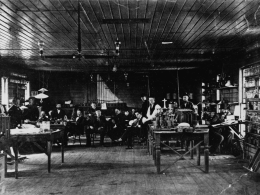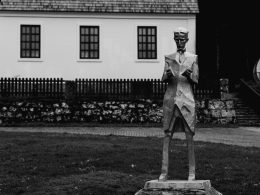Table of Contents Show
Early Life and background
In the tapestry of history, few threads are as vividly woven as that of Winston Leonard Spencer-Churchill, whose early life set the stage for a legacy of resilience, brilliance, and leadership. Born into the aristocratic family of the Marlboroughs on a chilly November day in 1874, at the grand Blenheim Palace, his entrance into the world was marked by the privilege and expectation attached to his lineage. Yet, his story is one of personal struggle, fierce independence, and a relentless quest to carve his own niche in the annals of history.
Winston’s father, Lord Randolph Churchill, was a figure of political stature, a Conservative who had carved his path through the corridors of power with eloquence and determination. His mother, Jennie Jerome, was an American heiress, celebrated for her beauty and wit. From these parents, Winston inherited a blend of aristocratic duty and the spirited independence of the New World. However, the glittering facade of his lineage belied the emotional distance and coldness of his parental relationships. It was in the nurturing care of his beloved nanny, Elizabeth Ann Everest, that young Winston found solace and affection.
The early years of Churchill’s life were marked by a restlessness and a sense of isolation. His academic journey, beginning at St. George’s School in Ascot and continuing through Harrow, was less than illustrious. He struggled with the traditional curriculum, his mind wandering to broader horizons beyond the classroom walls. Yet, it was at Harrow that the first sparks of his indomitable spirit were fanned into flame. Amidst the struggle, he discovered a love for the English language, a tool he would wield with unparalleled mastery throughout his life.
Despite his academic challenges, Winston’s ambition was undimmed. He yearned for adventure, for a chance to prove his mettle. This led him to the Royal Military Academy Sandhurst, where he trained to become an officer in the British Army. It was here, in the disciplined environment of Sandhurst, that Churchill began to thrive. The military life suited him, offering a structured outlet for his energy and a platform to demonstrate his leadership qualities.
Upon graduating, Churchill sought action and adventure, participating in military campaigns on the frontiers of the British Empire. In India, the Sudan, and South Africa, he served with distinction, showcasing not only his courage under fire but also his keen analytical mind. These experiences were not merely episodes of martial bravery; they were the crucibles that forged his character, imbued him with a profound understanding of war and conflict, and sparked his lifelong interest in history and strategy.
Parallel to his military endeavors, Churchill embarked on another career path that would define much of his life: writing. Even as a young soldier, he penned dispatches and reports from the battlefield, displaying an innate talent for narrative and analysis. This dual career of soldier and correspondent allowed him to finance his way through his early adventures, establishing his reputation both as a man of action and a man of letters.
It was during these formative years that the foundational elements of Churchill’s character were laid bare: his relentless drive, his refusal to accept defeat, and his remarkable ability to articulate the human experience. These traits, though in their nascent stages, hinted at the colossal figure he would become. Yet, they also masked the internal battles he faced, including bouts of depression, which he famously termed his “black dog.” These struggles, far from weakening him, added depth to his character, enabling him to empathize with the suffering and aspirations of others.
As the 19th century gave way to the 20th, Winston Churchill, now a seasoned veteran of war and politics, was poised on the brink of a public life that would see him navigate the tumult of world events. From the Boer War, where he was captured and made a daring escape, to the halls of the British Parliament, where he would soon make his mark, the early years of Churchill’s life were a prologue to one of the most storied careers in modern history.
In retrospect, the early life of Winston Churchill is not just a tale of aristocratic privilege or youthful adventure. It is a testament to the power of resilience, the importance of finding one’s passion, and the relentless pursuit of greatness against all odds. Through his struggles and triumphs, Churchill laid the foundation for a legacy that would not only define his life but also shape the course of the world. In the annals of history, his early years remind us that even the most towering figures begin their journey with a single step, fraught with challenges and lit with the promise of their potential.

Achievements and Milestones
Winston Churchill, a figure synonymous with resilience and brilliance, etched his name into the annals of history with a series of remarkable achievements and milestones that spanned the breadth of the tumultuous 20th century. His life, a testament to the indomitable spirit of perseverance in the face of adversity, unfolds like an epic saga, marked by chapters of triumph that shaped not only his destiny but that of the entire free world.
Churchill’s political odyssey began at the dawn of the new century when he entered the British Parliament as a Conservative MP for Oldham in 1900. Yet, it was his defection to the Liberal Party in 1904 that heralded his emergence as a formidable force in British politics. His tenure as President of the Board of Trade and Home Secretary was characterized by a zeal for reform, laying the groundwork for the modern welfare state. These early endeavors in government showcased his commitment to social justice and his capacity for visionary policy-making.
The prelude to the First World War saw Churchill at the helm of the Admiralty, where his foresight and innovation prepared the Royal Navy for the looming conflict. His advocacy for technological advancement, including the development of the tank and the bolstering of the Royal Naval Air Service, underscored his belief in the pivotal role of technology in warfare. Despite the shadow cast over his career by the Gallipoli campaign, Churchill’s resilience shone through. His return to the front lines, serving with distinction on the Western Front, was a testament to his unwavering spirit and dedication to his country.
The interwar years were a period of political exile for Churchill, a time he termed his “wilderness years,” yet he remained a vocal critic of the appeasement policies towards Nazi Germany. His prescient warnings of the growing threat posed by Hitler went largely unheeded, yet they underscored his deep understanding of the dynamics of international relations and his commitment to the defense of democracy and freedom.
The outbreak of the Second World War brought Churchill’s moment of destiny.
Appointed Prime Minister in 1940, at a time when Britain stood alone against the Axis powers, his leadership became Britain’s beacon of hope. Through the dark days of the Blitz and the uncertainty of war, Churchill’s speeches stirred the nation to resilience, his words a rallying cry for freedom: “We shall fight on the beaches, we shall fight on the landing grounds, we shall fight in the fields and in the streets, we shall fight in the hills; we shall never surrender.”
Under his stewardship, Britain became the fulcrum of the Allied resistance, forging crucial alliances with the United States and the Soviet Union. The war years, fraught with danger and despair, were also marked by strategic brilliance, as Churchill navigated the complexities of coalition warfare, the planning of the D-Day landings, and the negotiations for a post-war order.
In the aftermath of victory, Churchill’s focus shifted to the reconstruction of the post-war world. He was instrumental in the formation of the United Nations and foresaw the division of Europe in the Cold War, famously coining the term “Iron Curtain” in his Fulton speech of 1946. His warnings about the Soviet Union and his advocacy for unity in Europe laid the groundwork for NATO and the European Union, institutions that have shaped international relations for decades.
Churchill’s post-war premiership (1951-1955) was marked by a focus on peace and stability, navigating the challenges of the early Cold War with a steady hand. His enduring commitment to democracy and his visionary leadership cemented his legacy as one of the greatest statesmen of the 20th century.
Beyond his political and wartime achievements, Churchill was also a man of letters, awarded the Nobel Prize in Literature in 1953 for his vast array of published works, including the six-volume masterpiece “The Second World War.” His speeches and writings, imbued with the power of his intellect and the depth of his experiences, continue to inspire and educate.
Churchill’s life and career were a journey of extraordinary milestones, each marking his evolution from a young ambitious politician to a world leader whose decisions shaped the course of history. His legacy, however, is not merely etched in the victories and policies but in the spirit of resilience, the belief in the power of democracy, and the unyielding defense of freedom.
As the curtain falls on the epoch of Winston Churchill, the narrative of his achievements and milestones stands as a beacon for future generations. It tells a story of a man who, through the force of his personality and the strength of his conviction, navigated the ship of state through the stormiest of seas, leaving the world forever in his debt.
Challenges and Struggles:
In the tapestry of Winston Churchill’s life, interwoven with his triumphs and accolades, lie the threads of challenges and struggles that shaped the very fabric of his character. For Churchill, adversity was not merely an obstacle to be overcome but a crucible in which his resilience, determination, and indomitable spirit were forged.
One of Churchill’s earliest challenges came in the form of his struggle for acceptance and recognition within the British political establishment. Despite his prestigious lineage and early successes as a soldier and war correspondent, he faced skepticism and disdain from many of his peers. His brash demeanor, unorthodox views, and willingness to defy convention often alienated him from the political elite. Yet, Churchill refused to be cowed by their disapproval, relying instead on his intellect, charisma, and unwavering self-confidence to carve out his place in the world of politics.
Churchill’s political career was marked by a series of setbacks and failures, each serving as a test of his resilience and resolve. One of the most notable of these was his controversial role in the Gallipoli Campaign during World War I. As First Lord of the Admiralty, Churchill championed the ill-fated plan to open a new front against the Ottoman Empire, believing it would lead to a swift victory for the Allies. However, the campaign ended in disaster, with thousands of lives lost and Churchill’s reputation tarnished. It was a bitter pill to swallow for a man accustomed to success, yet he refused to be defeated by defeat, vowing to learn from his mistakes and press forward.
Despite his wartime heroics and stirring leadership, Churchill’s political career was far from smooth sailing. In the aftermath of World War I, he found himself marginalized within his own party, viewed by many as a relic of a bygone era. His staunch opposition to Indian independence and his advocacy for British imperialism further alienated him from the progressive wing of the Conservative Party. Yet, Churchill remained undeterred, tirelessly advocating for his beliefs and refusing to compromise his principles for the sake of political expediency.
Perhaps the greatest challenge of Churchill’s life came during World War II, when he was thrust into the role of Prime Minister at one of the darkest moments in British history. Faced with the looming threat of Nazi invasion and the specter of defeat, Churchill rallied the nation with his stirring speeches and unwavering resolve. Yet, behind the facade of strength and certainty lay a man plagued by doubt and uncertainty. As the weight of leadership bore down upon him, Churchill struggled with bouts of depression and anxiety, grappling with the enormity of the decisions he was forced to make.
The challenges Churchill faced during World War II were not only external but also internal. He clashed repeatedly with his military commanders over strategy and tactics, often finding himself at odds with their cautious approach. His insistence on aggressive action and his refusal to bow to pressure from his allies earned him both admirers and detractors. Yet, through it all, Churchill remained steadfast in his conviction that victory could only be achieved through boldness and determination.
As the war drew to a close, Churchill faced yet another daunting challenge: the prospect of rebuilding a shattered nation and navigating the complexities of the post-war world. His vision of a united Europe, free from the specter of tyranny and oppression, was ahead of its time. Yet, he found himself increasingly marginalized on the world stage, as the balance of power shifted in favor of the United States and the Soviet Union. Churchill’s attempts to preserve the British Empire and maintain Britain’s global influence were met with resistance from within and without, leaving him isolated and disillusioned.
In the twilight of his political career, Churchill faced perhaps his greatest challenge of all: accepting the inevitable march of time. As his health declined and his powers waned, he grappled with the realization that his days of glory were behind him. Yet, even in his twilight years, Churchill remained a formidable presence, his wit and wisdom undimmed by age.
In the end, Churchill’s life was a testament to the power of resilience, determination, and courage in the face of adversity. Through his struggles and challenges, he forged a legacy that continues to inspire and uplift generations to this day. For Churchill, adversity was not a barrier to success but a stepping stone to greatness—a reminder that it is in our darkest moments that our true strength is revealed.

personal characteristics
Within the annals of history, the figure of Winston Churchill stands as a colossus, not merely for the roles he played on the world stage, but for the intricate mosaic of his personality. His personal characteristics, a blend of paradoxes, were the crucible from which his greatness emerged, shaping his destiny and, in turn, the fate of the world.
Churchill’s resilience, perhaps the most celebrated of his traits, was akin to the steadfastness of the British Isles themselves, battered by storms yet unyielding. This resilience was not born of naiveté or blind optimism but was a conscious choice, fueled by an indomitable will to rise above circumstances. Even in the face of personal and political setbacks, his spirit remained unbroken, a beacon of hope in the darkest of times.
Coupled with his resilience was an unwavering courage, not just the physical valor he displayed as a young soldier but a deeper, moral courage. Churchill dared to voice unpopular truths, to stand firm in his convictions when they were most contested. In the political wilderness of the 1930s, he was a lone voice warning against the rise of Nazi Germany, a testament to his foresight and moral fortitude.
Churchill’s intellect was as formidable as his courage. His mind was a wellspring of ideas, knowledge, and curiosity that knew no bounds. This intellectual voracity was not confined to the realm of politics and history; it extended to literature, painting, and bricklaying. His Nobel Prize in Literature was a tribute not just to his mastery of the written word but to his profound understanding of human nature and history.
Yet, for all his intellectual prowess, Churchill was also endowed with a remarkable capacity for emotion. His speeches, imbued with passion and a deep sense of empathy, touched the hearts of millions. His writings, too, conveyed the depth of his feelings, reflecting a man who experienced the world not just through the lens of intellect but with the full range of human emotion.
Churchill’s humor was another of his defining traits, a tool he wielded with precision and grace. Even in the gravest of circumstances, he could defuse tension with a well-timed quip or a clever retort. His wit was not merely a defense mechanism but a bridge to others, making the weight of his responsibilities a little lighter, both for himself and for those around him.
Beneath the surface of the statesman lay a complex personality, marked by periods of what he referred to as his “black dog” of depression. These bouts of melancholy, far from diminishing his effectiveness, added a layer of depth to his character. They endowed him with a profound empathy, an ability to understand suffering and adversity, making him not just a leader of people but a champion for them.
Churchill’s leadership style was as unique as his personality. He was both visionary and pragmatic, capable of inspiring grandiose visions for the future while attending to the minutiae of government. His ability to communicate, to rally the British people with stirring oratory, was matched by his attention to detail, his hands-on approach to governance, and his relentless drive.
But perhaps the most enduring aspect of Churchill’s character was his adaptability, his ability to evolve in the face of changing circumstances. Throughout his career, he shifted political allegiances, navigated the tumultuous waters of public opinion, and adapted his strategies to meet the exigencies of the moment. This adaptability was not a sign of fickleness but of a profound understanding of the necessity of change, of growth, and of the need to meet the demands of an ever-evolving world.
Churchill’s life, marked by triumphs and setbacks, by moments of profound insight and periods of isolation, was a testament to the complexity of his character. His legacy, a tapestry of courage, intellect, emotion, and humor, continues to inspire and challenge us. It serves as a reminder that greatness is not the absence of flaws but the ability to transcend them, to turn personal challenges into the bedrock of character and leadership.
In the final analysis, Winston Churchill was more than the sum of his parts. He was a man of his time and for the ages, a figure whose personal characteristics shaped not just his destiny but the course of history itself. Through the prism of his personality, we gain insight into the essence of leadership, the importance of character, and the indomitable spirit of humanity.
Impact and legacy
As the dust settled on the tumultuous landscape of World War II, a singular figure emerged from the wreckage, casting a long shadow over the course of history. Winston Churchill, with his indomitable spirit, stirring rhetoric, and unwavering resolve, had become more than a statesman; he had become a symbol of defiance, a beacon of hope, and a guiding light in the darkest of times.
Churchill’s impact on the world stage was immediate and profound. As Prime Minister of Great Britain during the war, he rallied the nation with his stirring speeches and resolute leadership, inspiring a sense of unity and purpose in the face of overwhelming adversity. His iconic speeches, delivered with passion and conviction, galvanized not just the British people but the entire Allied cause, turning the tide of war and leading to the eventual defeat of Nazi Germany.
Yet, Churchill’s legacy extends far beyond his role in World War II. Throughout his long and illustrious career, he left an indelible mark on the world, shaping the course of history in ways both profound and enduring.
One of Churchill’s most enduring legacies is his contribution to the preservation of democracy and freedom. At a time when the forces of tyranny and oppression threatened to engulf the world, Churchill stood as a steadfast champion of liberty, refusing to compromise his principles in the face of adversity. His unwavering commitment to democratic values, human rights, and the rule of law served as a bulwark against the forces of totalitarianism, inspiring countless others to stand up for freedom and justice.
Churchill’s impact on the world stage was not limited to his political achievements; he was also a towering figure in the realm of international relations. His vision of a united Europe, free from the specter of war and conflict, laid the groundwork for the post-war peace settlement and paved the way for the creation of institutions such as the United Nations and the European Union. His efforts to forge alliances with the United States and the Soviet Union during the war were instrumental in shaping the global order and laying the foundation for the Cold War era.
Yet, for all his accomplishments on the world stage, Churchill’s impact was perhaps most keenly felt in the hearts and minds of the British people. To them, he was more than just a political leader; he was a symbol of national unity, a voice of reassurance in times of crisis, and a source of inspiration in the face of adversity. His stirring speeches, delivered with passion and conviction, rallied the nation in its darkest hours and inspired a sense of pride and determination that transcended the boundaries of class, creed, and ideology.
Churchill’s legacy also endures in the realm of culture and the arts. A prolific author, his literary works spanned a wide range of genres, from history and politics to memoirs and essays. His eloquence and insight continue to captivate readers around the world, inspiring new generations to explore the complexities of the human experience and the lessons of history. His speeches, with their timeless wisdom and moral clarity, remain a touchstone for leaders and citizens alike, reminding us of the power of words to shape hearts and minds.
In the decades since his passing, Churchill’s legacy has only grown stronger, as new generations continue to discover the depth of his character and the breadth of his achievements. From the halls of power to the classrooms of academia, his name is synonymous with leadership, courage, and resilience, a testament to the enduring power of the human spirit to overcome adversity and shape the course of history.
In the final analysis, Winston Churchill was more than just a man; he was a force of nature, a colossus of history whose impact continues to reverberate through the ages.
His legacy serves as a reminder of the power of leadership, the importance of courage, and the enduring value of principles in the face of adversity. As we navigate the challenges of the present and the uncertainties of the future, we would do well to heed the lessons of Churchill’s life and legacy, drawing inspiration from his example as we strive to build a better world for generations to come.






